Over 30 years of anarchist writing from Ireland listed under hundreds of topics
Review
Review: David Graebers ‘The Democracy Project’.
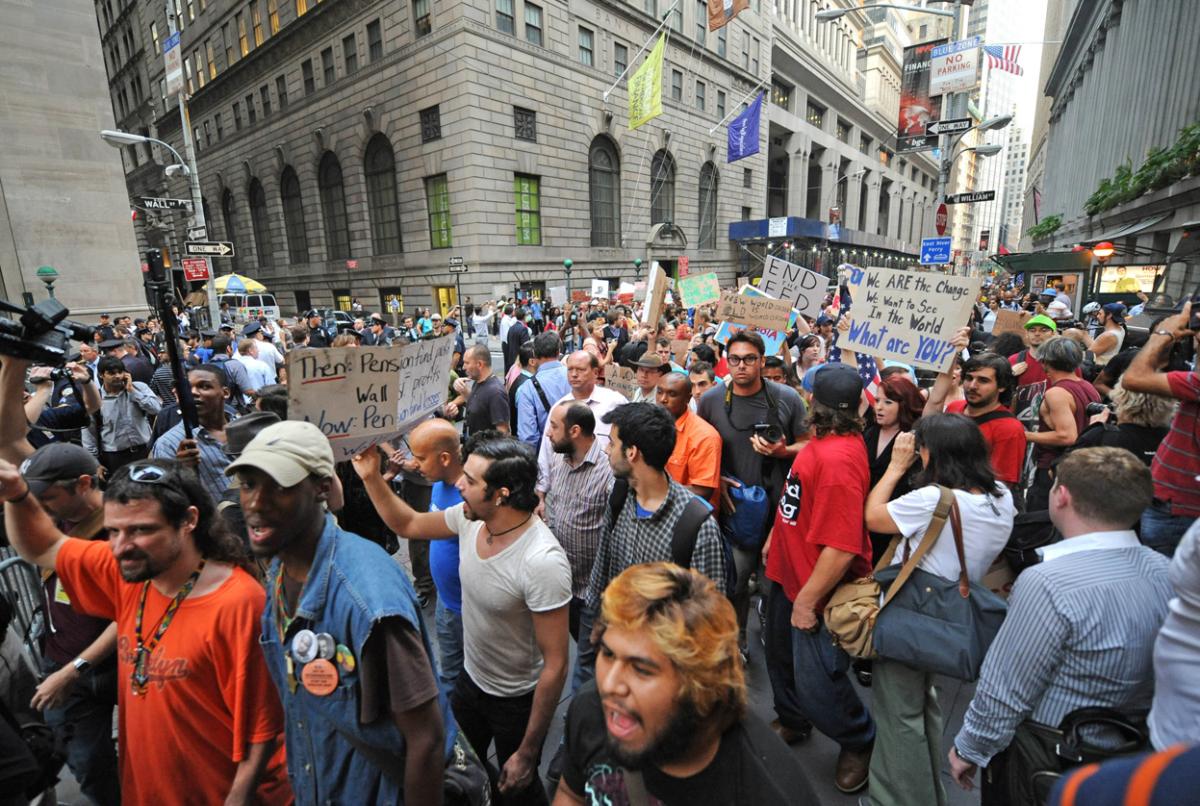 Many of us have an Occupy story. Mine took place in New York on March 17th of 2012, the six-month anniversary of the first occupation of Zuccotti Park, and the three-month anniversary of its eviction. I joined about five hundred or so Occupiers who had gathered after dark on the Manhattan side of Brooklyn Bridge. As we marched the three blocks or so to reclaim Zuccotti Park, NYPD’s finest, fully armed, literally lined the street each step of the way. And in the park itself a surveillance tower loomed overhead.
Many of us have an Occupy story. Mine took place in New York on March 17th of 2012, the six-month anniversary of the first occupation of Zuccotti Park, and the three-month anniversary of its eviction. I joined about five hundred or so Occupiers who had gathered after dark on the Manhattan side of Brooklyn Bridge. As we marched the three blocks or so to reclaim Zuccotti Park, NYPD’s finest, fully armed, literally lined the street each step of the way. And in the park itself a surveillance tower loomed overhead. Review of Gustavo Esteva’s talk on Anarchy and Buen Vivir at Kimmage - All Power to the Imagination
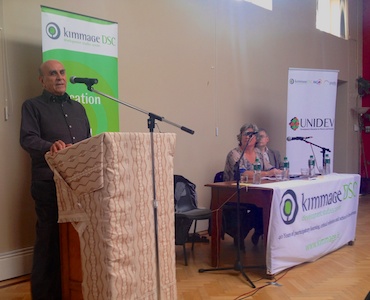 It does not prove difficult to persuade an anarchist to go to a meeting with the subtitle ‘ Anarchy and Buen Vivir (Good living)’ and more especially when the speaker, Gustavo Esteva, has direct links with the Zapatista Army for National Liberation (EZLN) who inspired the world with their uprising in 1994.
It does not prove difficult to persuade an anarchist to go to a meeting with the subtitle ‘ Anarchy and Buen Vivir (Good living)’ and more especially when the speaker, Gustavo Esteva, has direct links with the Zapatista Army for National Liberation (EZLN) who inspired the world with their uprising in 1994.
Gustavo was invited to speak by the Kimmage Development Studies Centre (DSC) as part of their 40th year celebrations. Gustavo addressed the gathering in the parish hall and started with the position that Development was counterproductive. Considering this was the Kimmage DSC’s raison d'être is to facilitate education and training for development practitioners, this was a sharp starting point.
Shadows of a revolution - Nick Lloyd's Spanish civil war walking tour reviewed
Ask an anarchist for an example of a time and place where their ideas were put to the test and they will most likely reply with “Barcelona, 1936”. In July of that year, the workers of Barcelona, mainly organised around the anarcho-syndicalist Confederación Nacional del Trabajo (CNT; "National Confederation of Labour") rose in opposition to the fascist generals' coup that was gripping the south of the Spanish state.
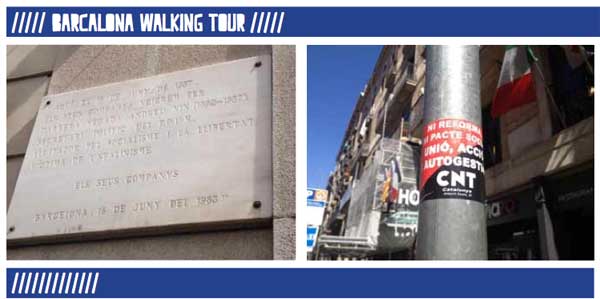
Review- Anarchy in a Cold War
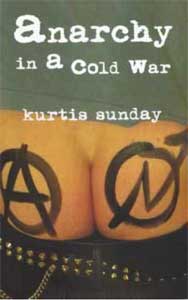 They say you can't judge a book by it's cover. The cover of the book, however, which has a picture of someone's buttocks with a circled A on one butt cheek and the squatter's symbol pretty much told me what was in store.
They say you can't judge a book by it's cover. The cover of the book, however, which has a picture of someone's buttocks with a circled A on one butt cheek and the squatter's symbol pretty much told me what was in store.
Policing the anti-war movement in Ireland
The following exploration of the policing of the anti-war demonstrations will be in two parts: the first will look at the change in policing through the eyes of a participant, a new activist, while the second will make a more thorough examination of the forces at work which lead to such a massive escalation in the policing of anti-war protest, particularly at Shannon, both on the side of the protesters and that of the gardaí.
Why we put this pamphlet together: Secrets, lies and unaccountable policing
It really does not take a lot of effort to come across anecdotal evidence of insensitive and sometimes brutal policing in working class areas in Ireland. As residents, community workers and educators in a wide variety of settings we have both personally experienced Garda violence and have heard countless negative stories about the gardaí. These stories cover a wide range of issues. Most consistently people, usually but not exclusively young men, complain of insults, intimidation on the street and of physical violence during arrest and in custody. The violence they describe is of varying degrees of seriousness and routinely involves minor assault (e.g. slaps, kidney punches and limb twisting etc) but more serious violence can and does occur (1).
CAHWT in a trap? - Review from 2013 Anarchist Bookfair
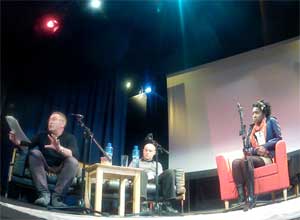 The talk on the Campaign Against Home and Water Taxes (CAHWT) at the Anarchist Bookfair 2013 in the Main Hall was relatively sombre in tone to say the least. The echoing clamour of the Main Hall only served to highlight the strange impasse which the campaign has found itself in of late. The assembled survivors could have fitted easily into Room 2, which was packed to capacity by speakers on issues which would seemingly be less of a political immediacy.
The talk on the Campaign Against Home and Water Taxes (CAHWT) at the Anarchist Bookfair 2013 in the Main Hall was relatively sombre in tone to say the least. The echoing clamour of the Main Hall only served to highlight the strange impasse which the campaign has found itself in of late. The assembled survivors could have fitted easily into Room 2, which was packed to capacity by speakers on issues which would seemingly be less of a political immediacy.
Guest review by Ciara
Come Here to Me blog discussion at the 2013 Dublin anarchist book fair
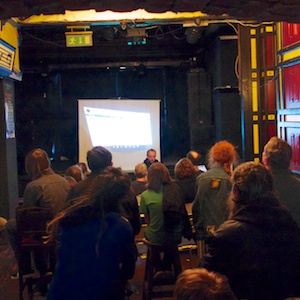 If you are not familiar with the infamous Come Here to Me blog then you should really have a look at it or the book and join thousands of other readers finding out about social history in Dublin. There are over 2,000 stories on the site addressing many different facets of everyday life and culture in Dublin from forgotten lanes, to overlooked monuments through to stories about the Gards, the eating habits of Dubs, and clubbing in the 50's and everything in between. The site has won a number of awards over the years and two of the authors spoke at the Dublin Anarchist Bookfair to a crowd of academics, librarians, archivists and many interested members of the general public.
If you are not familiar with the infamous Come Here to Me blog then you should really have a look at it or the book and join thousands of other readers finding out about social history in Dublin. There are over 2,000 stories on the site addressing many different facets of everyday life and culture in Dublin from forgotten lanes, to overlooked monuments through to stories about the Gards, the eating habits of Dubs, and clubbing in the 50's and everything in between. The site has won a number of awards over the years and two of the authors spoke at the Dublin Anarchist Bookfair to a crowd of academics, librarians, archivists and many interested members of the general public.
Review of Volume 2 of the Anarchist FAQ
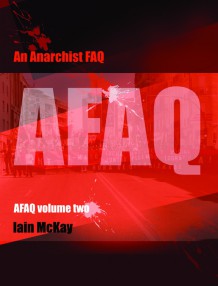 Back before many people had discovered the internet a small group of anarchists including this writer began work on the Anarchist FAQ. We were tired of having to provide the same basic explanations over and over as new people joined the news net group, alt.soc.anarchism, so we began the FAQ so newcomers could be referred to it.
Back before many people had discovered the internet a small group of anarchists including this writer began work on the Anarchist FAQ. We were tired of having to provide the same basic explanations over and over as new people joined the news net group, alt.soc.anarchism, so we began the FAQ so newcomers could be referred to it.
“The law is your shield, direct action is your sword” – Organising the Unorganised- audio & review
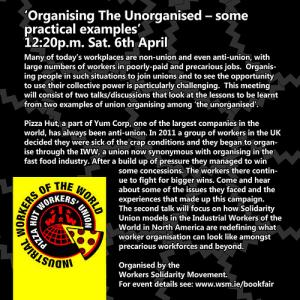 The topic of this talk (audio link below) was on organising unions in non-unionised workplaces, and possibly re-invigorating places where unions are ostensibly still organised. Our labour market locally is increasingly casualised, de-skilled, and less well paid. “Flexible” arrangements between employer and employee are the current code word for the slashing of security of contract and the threat of relocation of capital. Unions have historically been the only means of lower paid workers countering trends like these, so the question as to how workers organise and fight back is coming back into focus more and more. This talk intended to address just that, and the speakers put forward arguments for an alternative to the top-down trade unionism that evidently isn’t working today.
The topic of this talk (audio link below) was on organising unions in non-unionised workplaces, and possibly re-invigorating places where unions are ostensibly still organised. Our labour market locally is increasingly casualised, de-skilled, and less well paid. “Flexible” arrangements between employer and employee are the current code word for the slashing of security of contract and the threat of relocation of capital. Unions have historically been the only means of lower paid workers countering trends like these, so the question as to how workers organise and fight back is coming back into focus more and more. This talk intended to address just that, and the speakers put forward arguments for an alternative to the top-down trade unionism that evidently isn’t working today.

